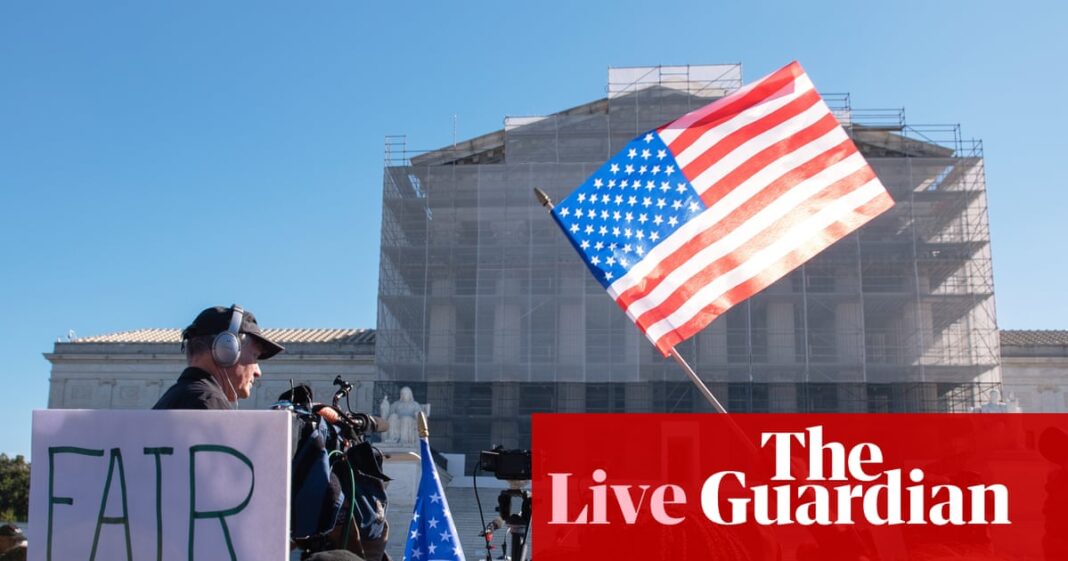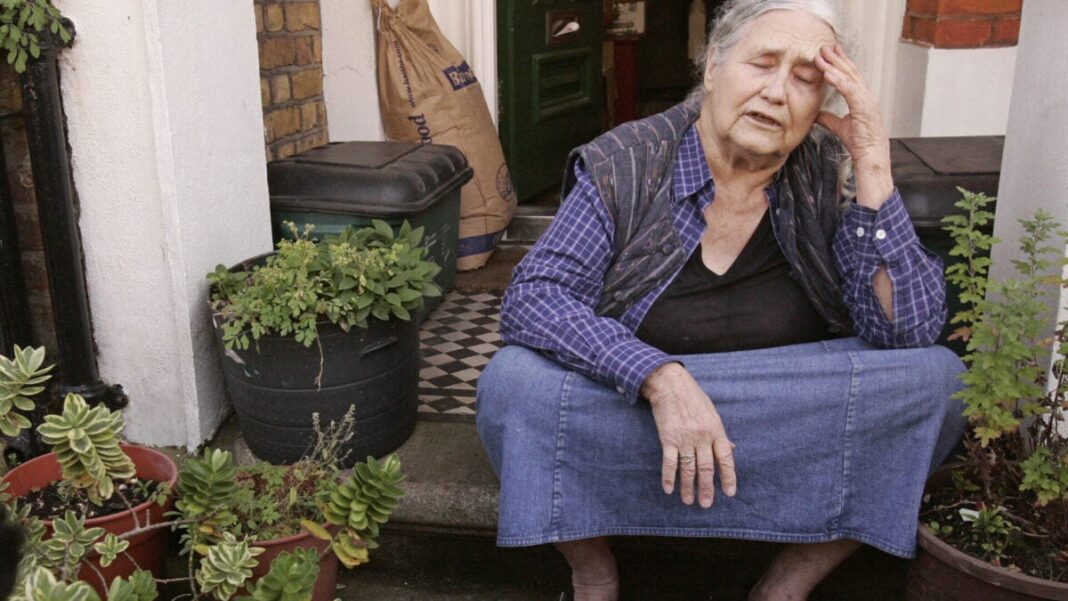Supreme court begins oral arguments in Voting Rights Act case
Oral arguments have started in the case challenging the constitutionality of a redrawn congressional map in Louisiana.
Janai Nelson, the president of the NAACP Legal Defense Fund, kicked things off. She noted that if the map at the center of this case is deemed to be “unsatisfactory”, the proper recourse is to “remand and adopt” one of the many alternative maps that address the section 2 violation of the earlier map.
Key events
David Smith
in Washington
A predominantly Black crowd has gathered outside the supreme court, as it continues to hear a case that threatens to gut the Voting Rights Act.
There are about 200 people, some holding signs and wearing T-shirts that say “Black voters matter”, “It’s about us”, “We will be heard”, “Protect our vote” and “Protect people, not power”.
One man is waving a giant black and white flag that proclaims: “Fuck Trump.” Another is holding a handmade sign that references former justice Thurgood Marshall and current justice Clarence Thomas, both African Americans: “Thurgood is watching you Clarence.”
Various speakers are coming to a lectern, their voices booming through loudspeakers. Cliff Albright of Black Voters Matter told the crowd: “We are blessed with power … We’ve got the power to move mountains … We’ve got the power to make good trouble … This court ain’t nothing but another mountain for us to move … When we believe, we win.”
Some distance away, half a dozen police officers are standing guard outside the court, which is covered in scaffolding.
Hashim Mooppan, the principal deputy US solicitor general who is representing the Trump administration, is now speaking before the court.
Supreme court appears poised to undercut key provision of Voting Rights Act
As oral arguments at the supreme court continue, the conservative justices, who make up most of the bench, appear sympathetic to the case that new Louisiana congressional maps – which added a second majority-Black district – violate the constitution.
At the heart of the case is section 2 of the Voting Rights Act, which prohibits electoral maps that dilute the voting power of minority groups. Lawyers for the state of Louisiana, a group of “non-African American voters” and the Trump administration say that the court needs to do away with the 2024 map. If the court agrees, it would ultimately set a precedent that makes it considerably harder to bring redistricting lawsuits on the basis of race, and undercut section 2.
Edward Greim, representing the “non-African American” challengers who appealed the 2024 congressional map, is now up.
“It is time to reach a question this court has never reached and hold that section 2 alone is no compelling interest for racially gerrymandering citizens like the appellees,” Greim said. “The court should affirm and direct the district court to order a remedial map in time for the 2026 elections.”
Aguinaga pushed back against Nelson’s argument that any gutting of section 2 of the Voting Rights Act would be “catastrophic”.
“I think there’s been a lot of sky is falling rhetoric from the other side in this case,” Aguinaga said. “I’m not I don’t know what our legislature would do if the court rules in our favor … I don’t think the sky is going to fall.”
A post about the possible impact in today’s case. If the supreme court rules to scrap section 2 of the Voting Rights Act, it could possibly cost House Democrats up to 19 congressional seats, according to a report by two progressive voting rights groups.
“It’s enough to cement one-party control of the US House for at least a generation,” said Fair Fight Action and Black Voters Matter.
In responding to a question by Justice Samuel Alito, the Louisiana solicitor general said that the Black population within Louisiana doesn’t satisfy one of the pre-requisites of the Gingles test – namely that the minority population is geographically compact.
“You can identify pockets of black voters, but they are dispersed across the state there’s no way you can conceive of that population as compact,” Aguinaga said.
An important note here, Louisiana has switched sides since March, the last time the supreme court heard this case.
“We’ve taken the position that section 2, insofar as it requires race- based redistricting, is unconstitutional,” Aguinaga said.
Now up is Benjamin Aguinaga, the solicitor general of Louisiana.
“Race-based redistricting is fundamentally contrary to our constitution,” he said in his opening argument, adding that racial stereotypes are a consequence of the practice.
“They assume, for example, that a black voter, simply because he is black, must think like other black voters, share the same interests and prefer the same political candidates, and this stereotyping system has no logical endpoint.”
Justice Sonia Sotomayor asked Nelson to answer the constitutionality question of the maps in question, particularly it relates to the court’s 2023 decision that ruled race-based college admissions violate the Equal Protections Clause of the 14th amendment.
Nelson said that the court “made it clear that it is still constitutional to use race to remedy specified discrimination”.
She noted that decision, from two years ago, is “working more in our favor, we believe, than supporting our opponents”.
Nelson was just asked by Justice Elena Kagan what the consequences would be if the court got rid of section 2.
“I think the results would be pretty catastrophic,” Nelson said. She went on to say that many of the Black representatives in Louisiana alone were elected from districts that exist because of the Voting Rights Act.
One particular term we’re hearing a lot about in Nelson’s arguments is the “Gingles Test”, which determines if a minority group is being subjected to voting dilution.
“Gingles is an exacting test. It is data obsessive. It brings in experts and many other forms of evidence to establish a racial violation,” Nelson said.
There are three criteria for a minority group to meet Gingles, which came about after a landmark supreme court decision in 1986. Here’s a breakdown, courtesy of ScotusBlog.
-
The affected minority group is sufficiently large to elect a representative of its choice.
-
The minority group is politically cohesive.
-
The majority votes sufficiently as a bloc to usually defeat the minority group’s preferred candidates.





